There is a long standing argument on SVTP, and in the automotive world in general, as to which is better; a gas powered truck or a diesel powered truck. The classic comparison seems to be the Powerstroke diesel to the modular V10. I’m sure we’ve all heard the advantages and shortcomings of each, so I’m not going to dig into those in depth again. For a little refresher on each check out this article:
Can the 6.8L V10 Put More Power to the Ground than a Powerstroke Diesel?
In this article I’m just going to attempt to quickly compare the basic cost of ownership of four engines the 6.4L and 6.7L Powerstrokes, the Boss 6.2L V8, and the modular 3-valve V10. We’ll look at the price to purchase, both new and used, along with maintenance costs and potential reliability related issues. I have had quite a bit of seat time in 2009 F-350s equipped with both the 6.4L Powerstroke V8 and the 6.8L V10. My analysis will come from that experience. I’ll try to keep the discussion as factual as possible. So let’s get right into it.
Price – New Purchase Price and Resale Value
Let’s face it, the purchase price of a new diesel truck flat out hurts. Like everything else, except lap-top computers and flip-phones, diesel engine option cost has been going nowhere but up for the last few years. When we bought the 2009 SVTP F-350 ( details about it can be found in this thread: Introducing the SVTPerformance F-350 Super Duty) it cost $6895 to tick the option for the 6.4L Powerstroke. Since then the price for a diesel engine in a Super Duty has risen to $7835 for the current 6.7L Powerstroke V8. Those prices seem pretty outrageous when compared to the mere $600 is used to cost to get the 6.8L V10 or the $0 it takes to option the new 6.2L V8 (it’s the standard engine in the Super Duty for 2011). But hey, that’s what it costs to play with the big boys, right? Maybe not, again check out this thread for details:
Can the 6.8L V10 Put More Power to the Ground than a Powerstroke Diesel?
Pulling power and the ability to haul a load or tow better is a discussion for another time though. For this article we’re just going to focus on the cost of ownership. We basically want to help those who don’t “need” a diesel engine decide whether they should buy one or save the cash and pick up a gas powered truck.
Many people often tout that the diesel trucks hold their value better than the equivalent gas powered truck. Others counter that this is a misconception, that any higher resale value is simply a product of the higher initial purchase price of the diesel truck. To put these theories to the test we went to NADA.org and priced out two identical trucks except for the choice of engines. Both were 2009 models that are fairly similar to the SVTP F-350. With 20,000 miles on the clock the V10 powered truck had a clean retail price (what you’d expect to see at a dealership) was $38,200, while a diesel equipped truck came to $45,875. So we come up with a difference of $7,675, or $780 more than the Powerstroke option initially cost. It would appear that the diesel does in fact hold its value better than an equivalent gas powered truck, in at least one possible combination. Interesting info to say the least.
Fuel – Real World Mileage Figures and Fuel Price
For years the fuel economy department is where diesel engines shined. This was due in part to diesel being a more energy dense fuel than gasoline (more BTUs per gallon), and the higher thermal efficiency of the Diesel combustion cycle as compared to the Otto cycle used by most gas engines. However, with the increase in emissions requirements over the past few years that advantage over gas trucks has dwindled. Anyone who reads up on the 6.4L Powerstroke trucks will quickly find out that many owner’s number one complaint seems to be deplorable fuel mileage. I can tell you from experience, in stock form, it’s true. When stock, the SVTP F-350 would average about 13MPG in mixed driving. That is basically the same mileage a good friend of mine was getting with his V10 powered truck. Once we added a DPF delete, tune, and intake the average came up to 16-17MPG with mostly highway driving. That’s not bad for an 8,000 pound 4x4 truck. It’s been reported that the 2011 trucks with the 6.7L diesel get about 16-18MPG in mixed driving and that you can expect about 14-16MPG out of the 6.2L V8. Additionally, you can expect all of these mileage figures will vary greatly depending on the truck’s configuration, driveline, and gearing.
However, there’s another component here at work too. Diesel fuel is significantly more expensive than regular 87 octane gasoline. Current prices here locally are $3.51/gallon for diesel and $3.19/gallon for 87. That extra $0.32 per gallon can start adding up when you get less than 20MPG and are filling up a 30+ gallon tank. When you add that extra cost to the nearly $8,000 extra for the diesel option it starts making the gas engine look a bit more appealing even if it gets less mileage.
Oil and Filters – Oil Quantities, Air, Oil and Fuel Filter Costs
When most people think of maintenance on their vehicles the first thing to come to mind is typically an oil change. Where most other maintenance procedures are the same on either a gas or diesel powered truck an oil change is very different in terms of price between the two. For starters, a diesel truck with usually require between 13-15 quarts of oil versus 7 quarts for the gasser. The oil filter for the diesel can easily cost over $20 while the one used by Ford’s gas engines usually cost less than $4.
Recommended oil change intervals are basically the same for each type of engine. Price can also fluctuate depending on the oil type the owner chooses to use. However, if you just do a straight comparison the diesel oil change will cost over double what that of a gasser will run. Depending on how often you change your oil this could add up quickly. Just another thing to consider when making your engine choice.
Another added cost of diesel maintenance, one of which many first time buyers are unaware, is fuel filters. On the 6.4L and 6.7L engines there are two of them and they must be replaced every other oil change. They will run you $75 for the 6.4L and $88 for the 6.7L. Compare this to the $24 filter on the gassers which are only scheduled to be changed every 50,000 miles.
Another thing to consider is the 6.7L Powerstroke requires Diesel-Exhaust-Fluid. It's tank is designed to be refilled a the time of an oil change. I'll cost you about $9 per gallon from your Ford dealer and take about 4 gallons to fill the tank after 5,000-7,500 miles of driving. This is an expense that the gas powered trucks don't have to deal with.
Fuel Additives
In 2007 the EPA mandated that all road driven diesel trucks must use ultra-low sulfur diesel fuel (“ULSD”). Previously the fuel used by these trucks was known as low sulfur diesel fuel (“LSD”). The difference between ULSD and LSD is given away by their names, ULSD simply has less sulfur (15ppm vs 500pm for LSD). This change in the fuel had an unintended detrimental side effect. ULSD has less lubricity than LSD. This is significant because the fuel systems in diesel engines require a certain amount of lubrication and that lubrication must be provided by the fuel passing through it. Without that lubrication components such as the injectors and high-pressure fuel pump can suffer premature wear.
In order to recover some of the lost lubricity of the newer ULSD fuel many diesel owners add a fuel additive to the tank when filling up. I personally use Ford’s Motorcraft Cetane Booster. It costs about $8 per 24 Oz bottle, which should last for about five-six fill-ups. It also has the possible side benefit of adding a little power. I can’t say that I’ve ever felt any difference with it. However, using the additive does give piece of mind that I’m doing something to protect the very expensive fuel system components. By very expensive I'm speaking of the 6.4L's $1,200 High-Pressure-Fuel-Pump and eight $320 fuel injectors.
Gasoline powered engines simply don’t have this problem. Unless you really have a burning desire, there’s no real reason to use a fuel additive in one of them. The entire fuel system will likely last hundreds of thousands of problem-free miles with little to no maintenance.
Engine Complexity
There is absolutely no comparison to make here. Any modern diesel engine is simply worlds more complex than its gas powered cousin. If you enjoy working on your own vehicles and want occasionally be horrified by something simply take a look under the hood of a 2011 6.7L Powerstroke powered Super Duty. It is simply amazing that Ford managed to fit all of that stuff in there. You can’t even see a valve cover without fairly close examination. This is all before you look under the truck and see the emissions equipment, which includes an enormous exhaust after-treatment system including a urea injection apparatus.
By comparison the 6.2L gasoline V8 is cave man simple. It’s basically no more complicated than a 4.6L 3V engine you’d find in earlier S-197 Mustang GTs. The only thing that makes it the slightest more intimidating from a complication standpoint than any other modern gasoline engine is that it has two sparkplugs per cylinder. Other than adding a bit more to the cost of a plug change, it’s not really that bad.
I hate to sound old-fashioned here, but a more complicated engine does simply just have more things to go wrong with it. Is that to say that I want to go back to the days of carburetors and points type distributors? Not in the least. I’m more than willing to have a more complicated machine if that complication makes the vehicle better in some way. The problem with newer diesels is that the vast majority of the added bits are simply there to help clean up a dirty engine so it can comply with the latest EPA regulations. While I can’t ever recall complaining that the air I was breathing was just too clean, it is more than just a bit disconcerting that a failed EGT cooler can destroy a $14,000 engine. Unless you are willing to spend the time and money to delete the emissions equipment on your new diesel, and consequently make it illegal to drive on the road, all the added complications and potential failure areas of a modern diesel is something you should keep in mind when shopping for a new truck.
Warranty Coverage
The warranty coverage is fairly straight forward. For the diesel powered Fords you get a 5 year or 100,000 mile engine warranty. For the gas rigs the powertrain warranty covers the engine for 5 years or 60,000 miles. Out-of-warranty repairs are going to be expensive for either engine, that’s pretty much a given. You have to basically ask yourself which one is more likely to have problems after the warranty expires. From my experience having a diesel without a warranty can be a bit frightening, and you’ll probably hear the same from anyone who ever had to replace the head gaskets on a 6.0L Powerstroke. Needless to say, things can get expensive rather quickly.
Conclusion
So there we have it. For the most part, a diesel powered Super Duty is much more expensive to purchase, own, and operate than its gas powered brother. I’m not sure how many buyers really take that into consideration when buying their new truck. Then again, if you can afford the $8000 option price for the diesel engine you’re probably not going to sweat an extra $50-100 here and there.
However, that brings us to the question as to whether the added cost is really worth it. The end consumer is really the only one who can decide that, but I’ll give my opinion on the subject. First, I love the power of a tuned common rail diesel. There’s no denying the awesomeness of that enormous surge of torque down low. That alone may make it worth the cost of admission for some, and there’s nothing wrong with that. It’s your money and you should spend it how you want. My basic advise comes down to this; if you’re buying a 2011 truck and need the towing ability of a diesel you should buy one. If you don’t have a need to tow that much weight I’d just skip the 6.2L powered Super Duty and just buy an F-150. It’s a much more refined truck and is a very capable vehicle. If you’re buying an older truck and want diesel power and towing ability for a fraction of the price, buy a 3V V10. It will tow basically as well as a stock 6.4L diesel and do it for much less money (other than the decreased mileage).
There’s one more thing to discuss here, and that is modding. As with most any other vehicle discussion, when you start throwing mods at these truck all bets are off. Basically anything is possible if you’re willing to put the money into it, and in some cases you have to be willing to operate your vehicle illegally if you disable a pollution control device. Again, this comes down to the end consumer again. If you’re willing to add some mods I would definitely look into buying either a 6.4L or 6.0L Powerstroke equipped truck. By putting a couple thousand dollars on the table you can make a very reliable and powerful rig that will operate more efficiently and more cost effectively. In the case of the 6.4L engine you can make absolutely insane power for a very small about of money. In fact, the SVTP F-350 made nearly 950rwtq with merely a tune, exhaust, and CAI. Fun times indeed.
I can basically distill my opinion on the information in this article into these four statements:
1. Diesels are damned expensive to purchase and operate.
2. If you don’t need a diesel you probably shouldn’t buy one.
3. It’s your money, you should buy what you want.
4. Tuned diesels are fun.
The 6.2L V8 is a very robust engine, built with performance and durability in mind.

The 6.2L features two spark plugs per cylinder, and a layout that should be familiar to those acquainted with the Modular engine line.
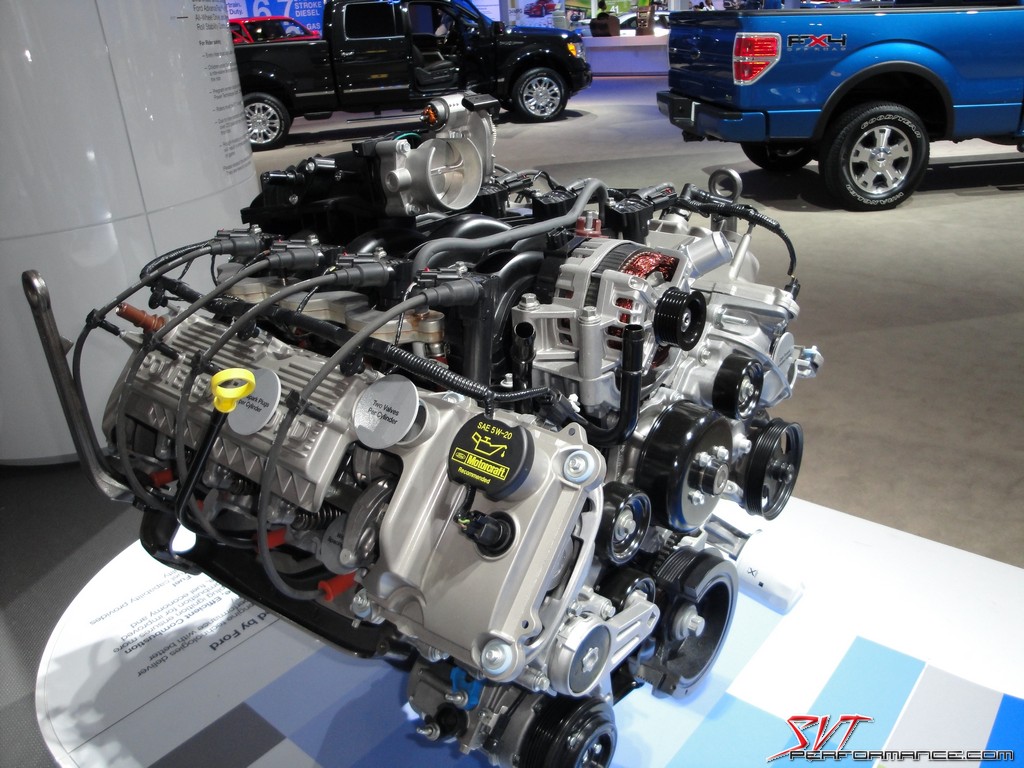
High-Pressure Common-Rail Injection and computer control have revolutionized the world of diesel performance.
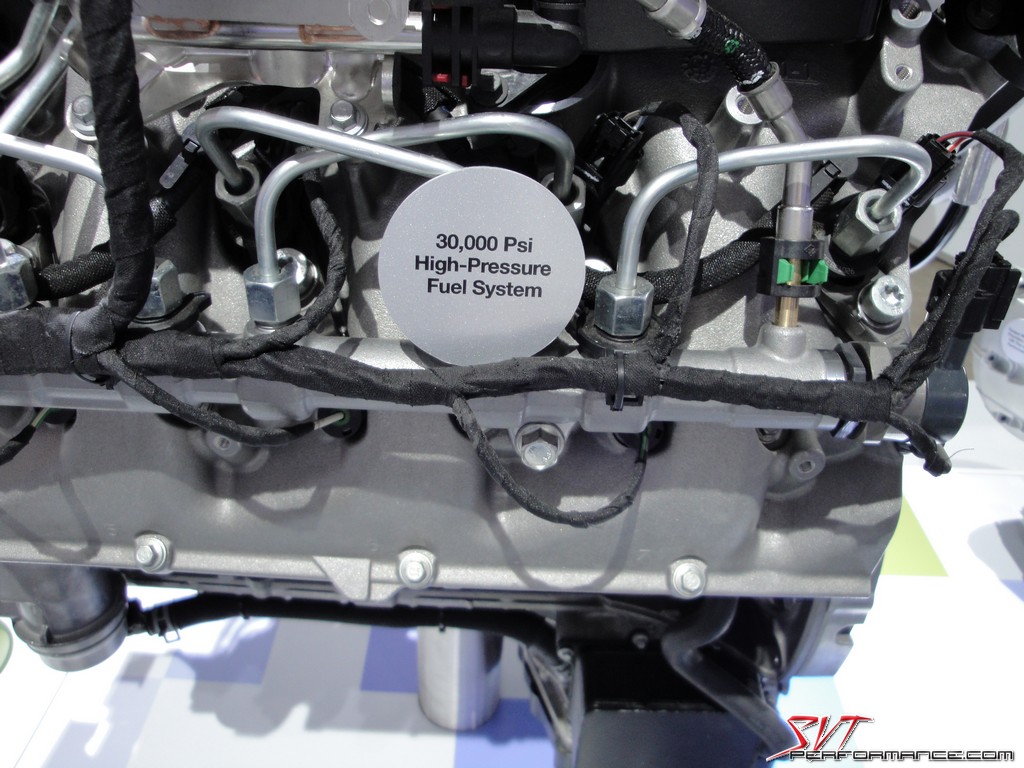
Like many modern engines, the 6.7L Powerstroke features a phenolic water pump turbine.
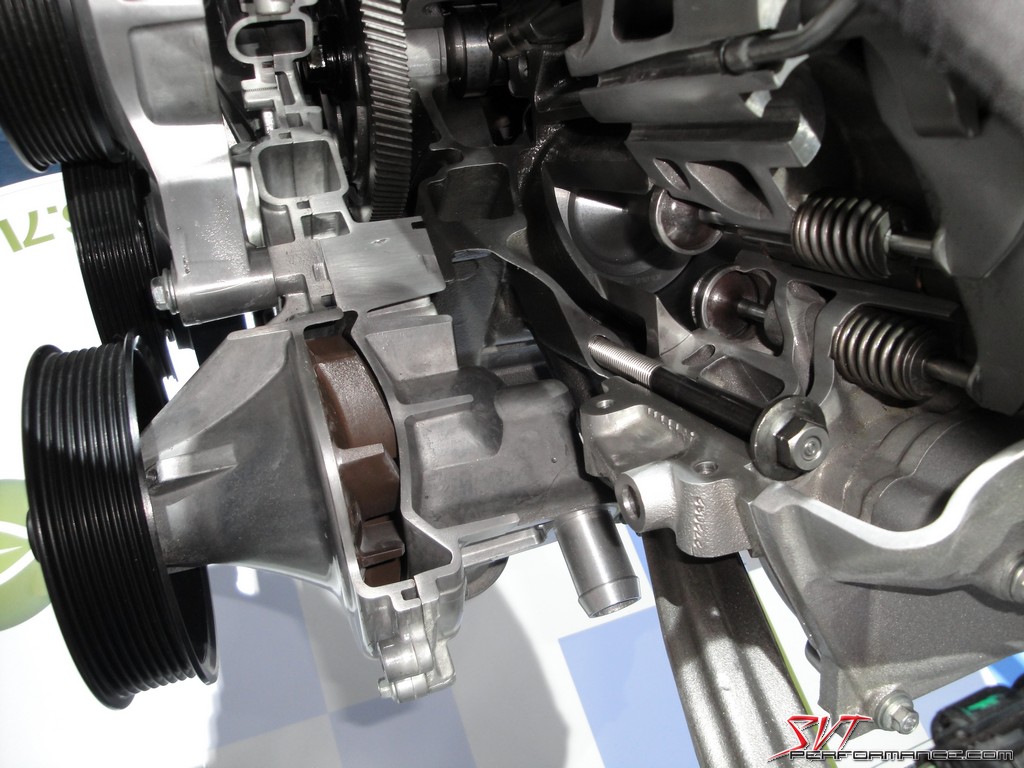
One of the design features found in most diesel engines that leads to their increased durability is a gear driven timing set and high-pressure fuel pump.
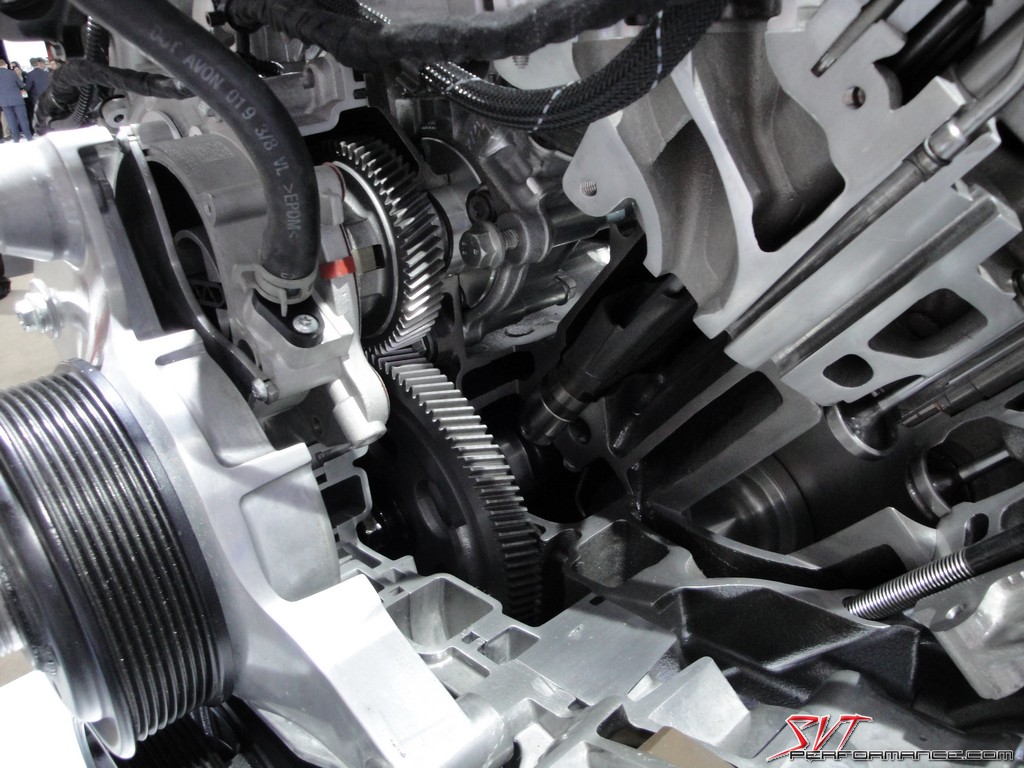
With 32 valves, 32 pushrods, and 32 rocker-arms the 6.7L's valve-train is not an uncomplicated affair.
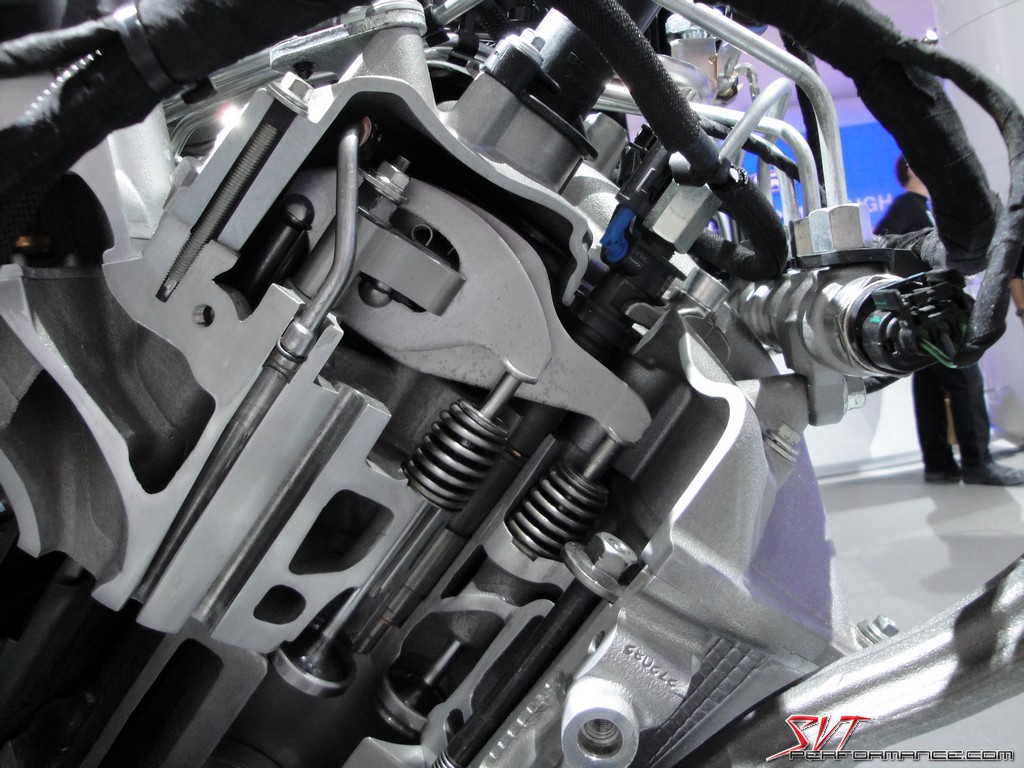
Here you can see the cylinder wall thickness in the Ford 6.2L V8 gas engine. It is cast from typical gray-iron.
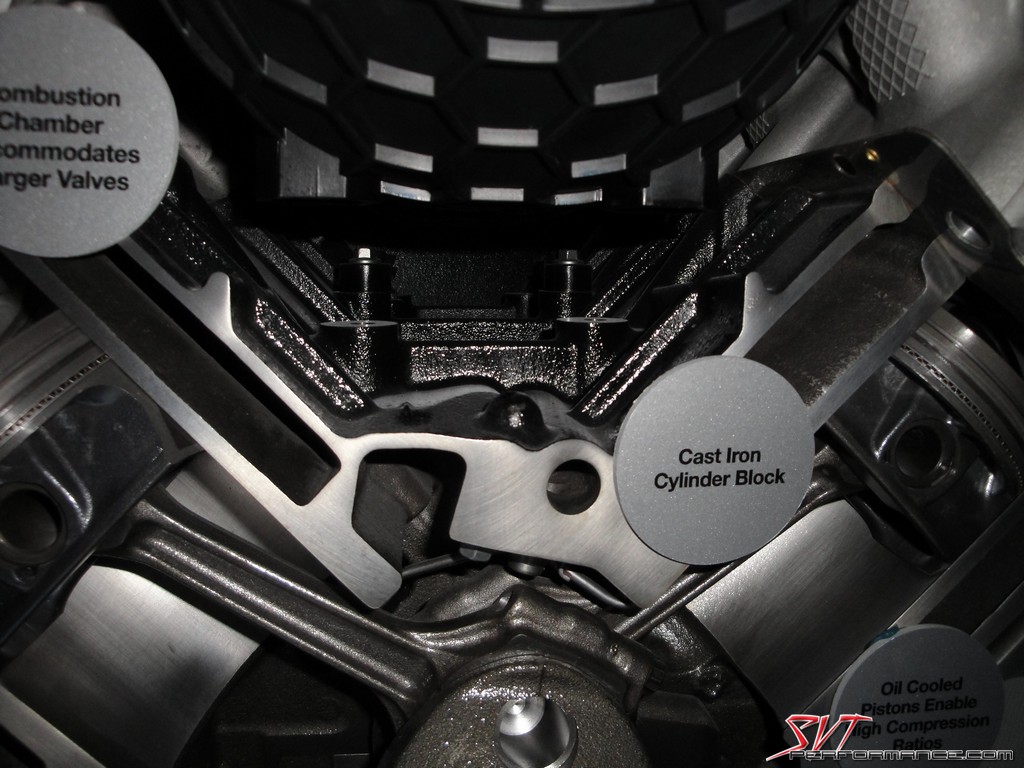
By contrast, The 6.7L Powerstroke features much thicker cylinder walls (for durability) and the block is composed of much stronger compacted graphite iron.
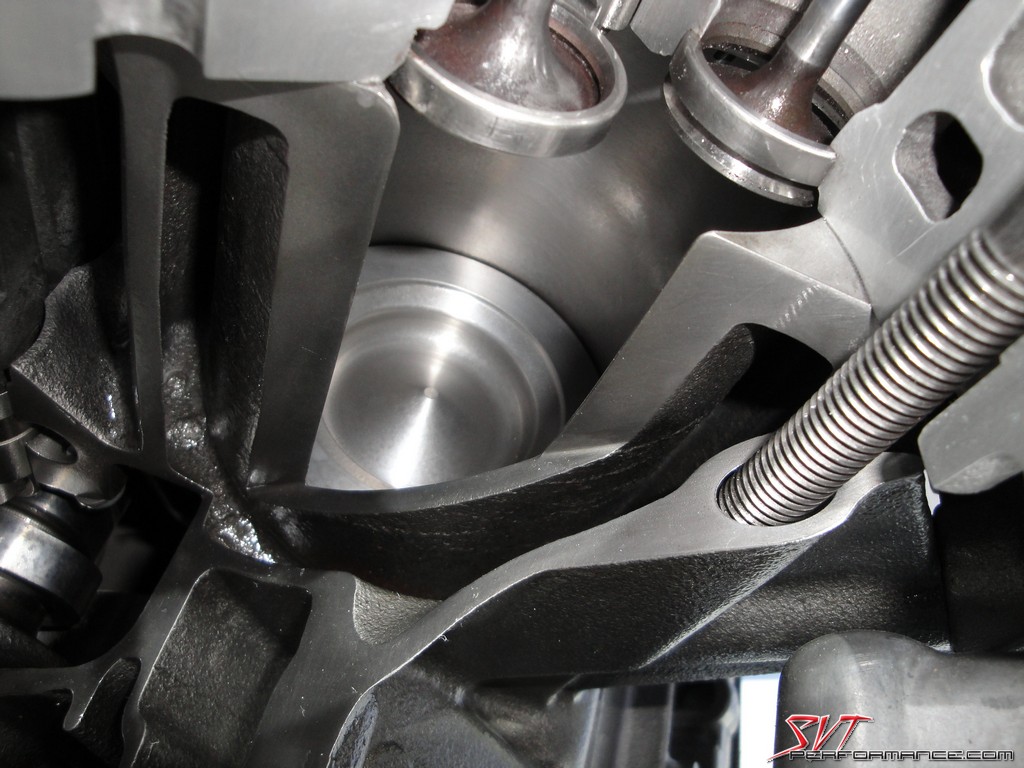
The lifters in the 6.7L sizable, to say the least. You can also see a piston cooling oil squirter in this photo.
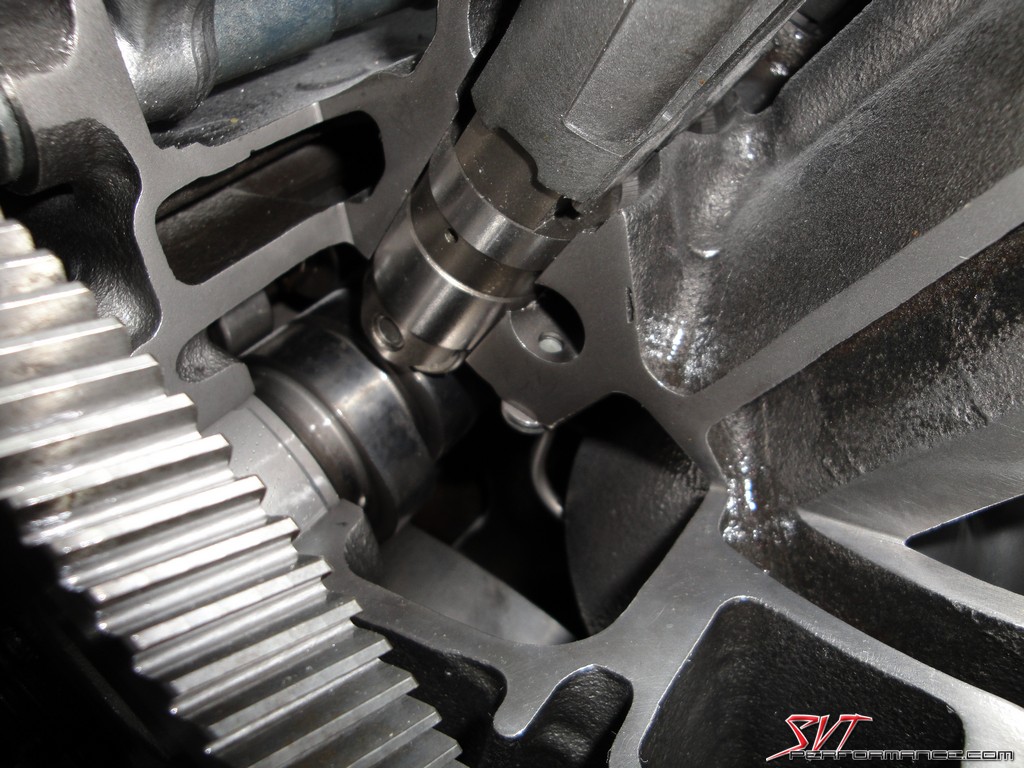
The turbo is buried under quite a few parts on a 6.7L. Put aside a few hours if you plan on removing it.
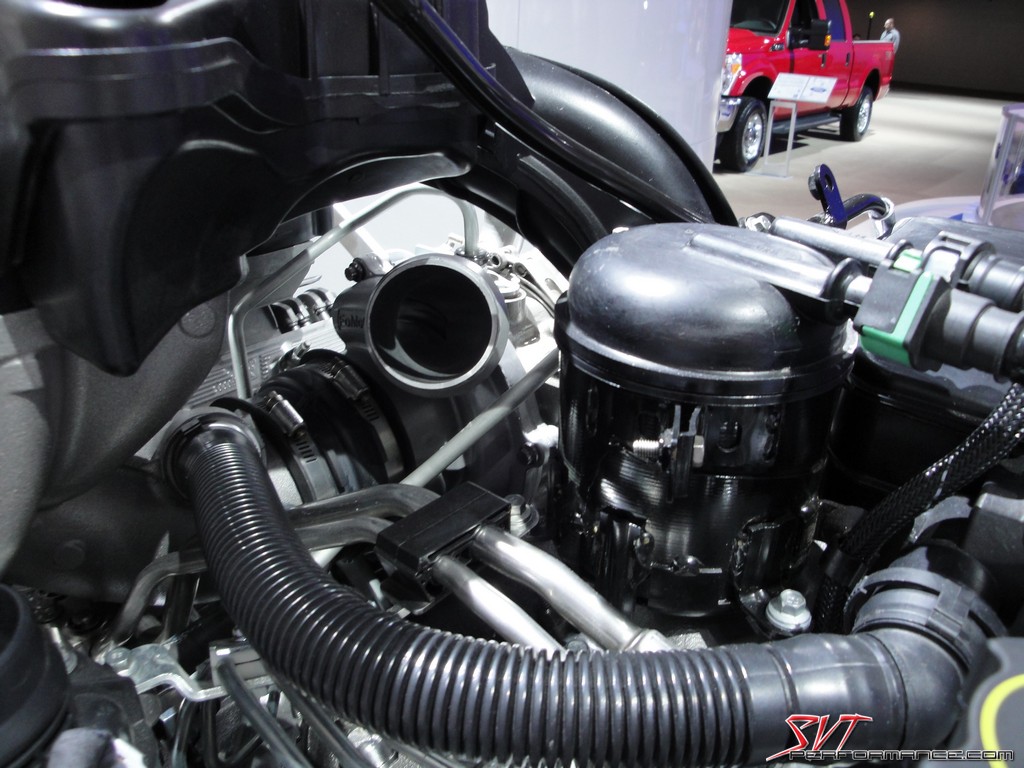
The EGR-Cooler is one of the emissions components that has plagued diesel engines for the last few years. The 6.7L seems to have a much better constructed one than the 6.0L and 6.4L Powerstrokes.
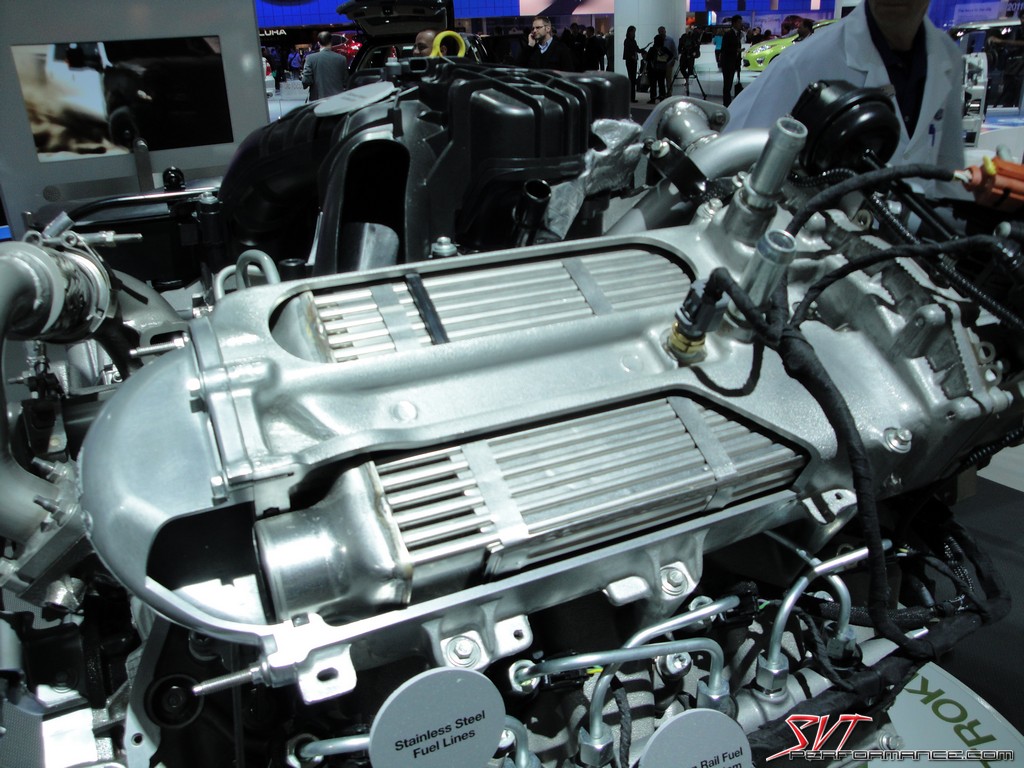
Sadly, this massive,power robbing, exhaust system is required in order for the 6.7L Powerstroke to meet the current EPA emission standards.
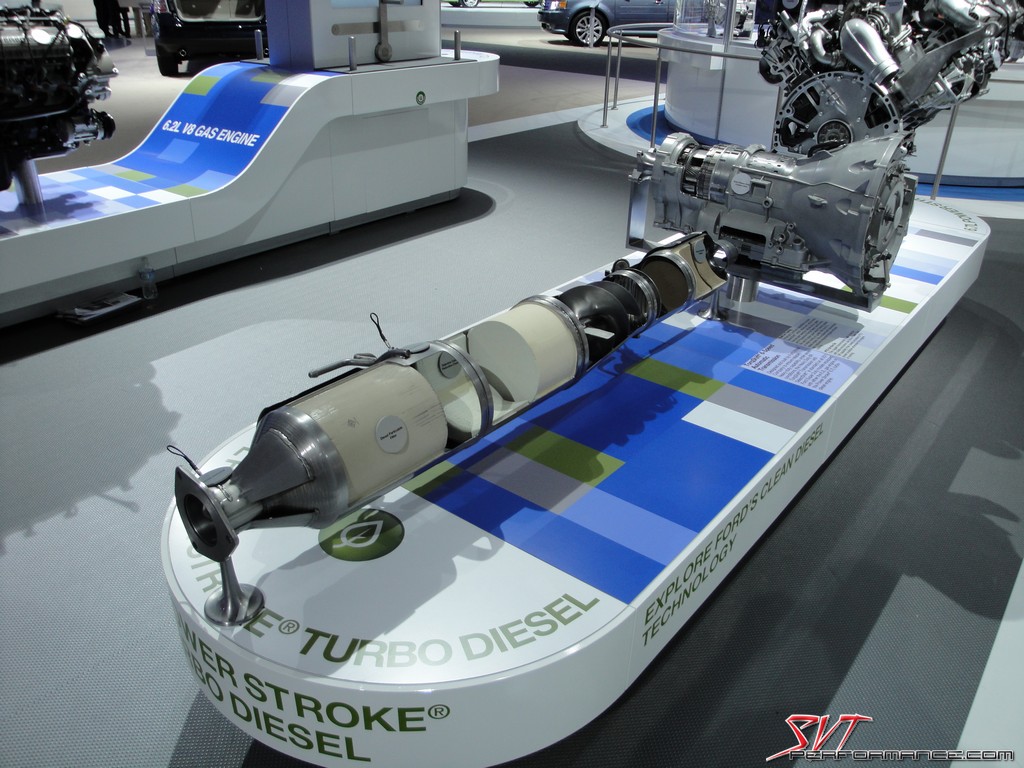
Variable-geometry turbochargers are basically a diesel industry standard at this point.
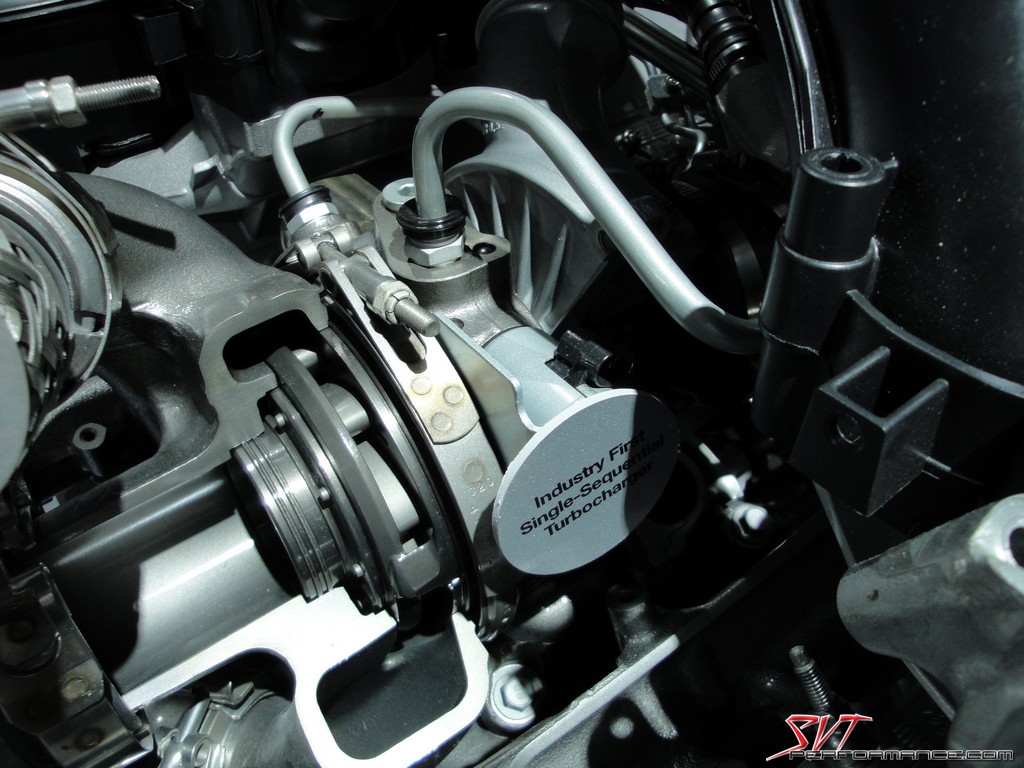
This massive torque converter in a 6R140 transmission is found behind the 6.7L Powerstroke. The 6.2L V8 also uses this tranny.
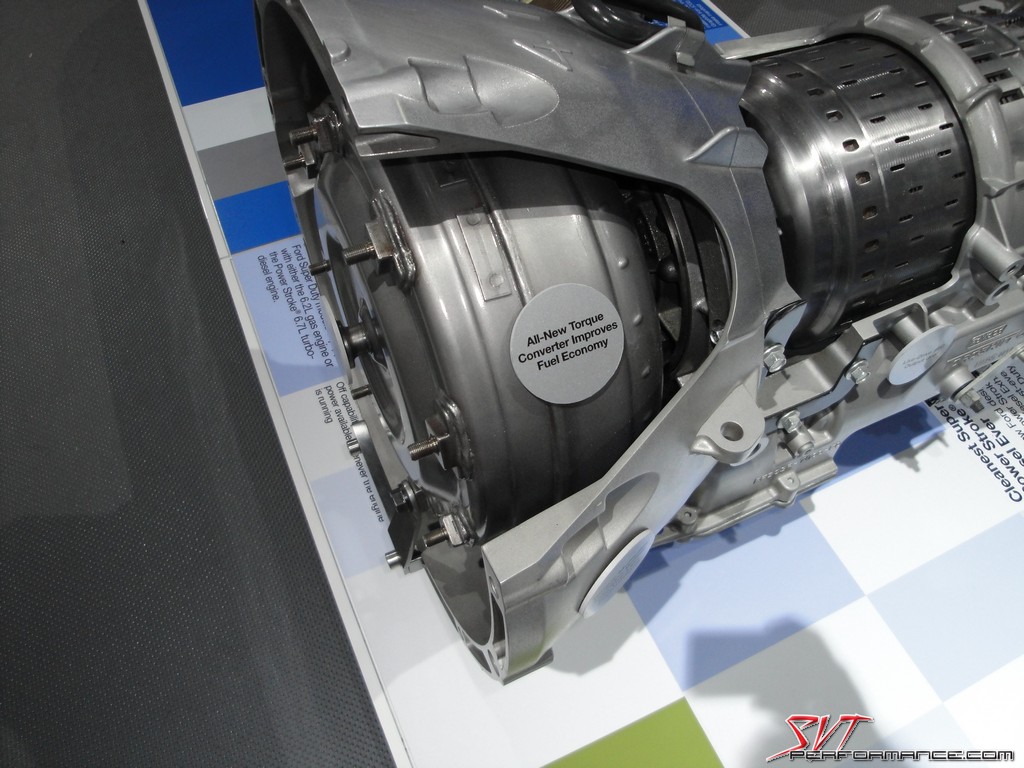
Here you can see beautiful simplicity in the valve-train design of the 6.2L The roller tipped shaft-mounted rocker-arm rides on the centrally mounted camshaft.
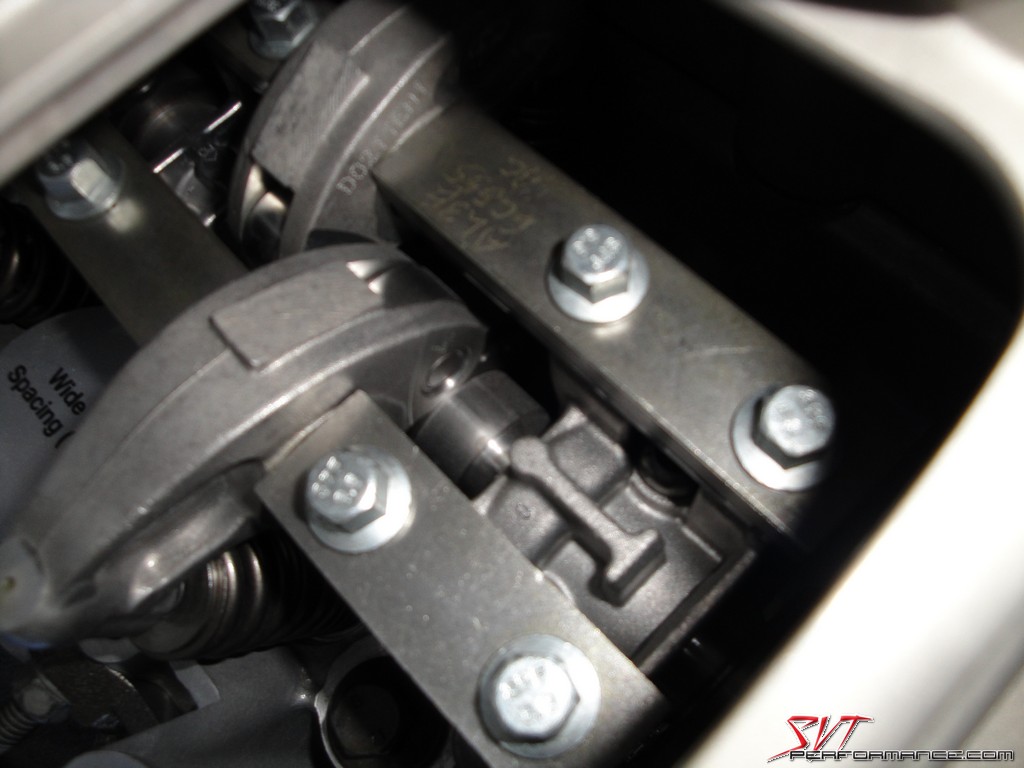
A hydraulic lash adjuster is situated on the tip of the valve stem.
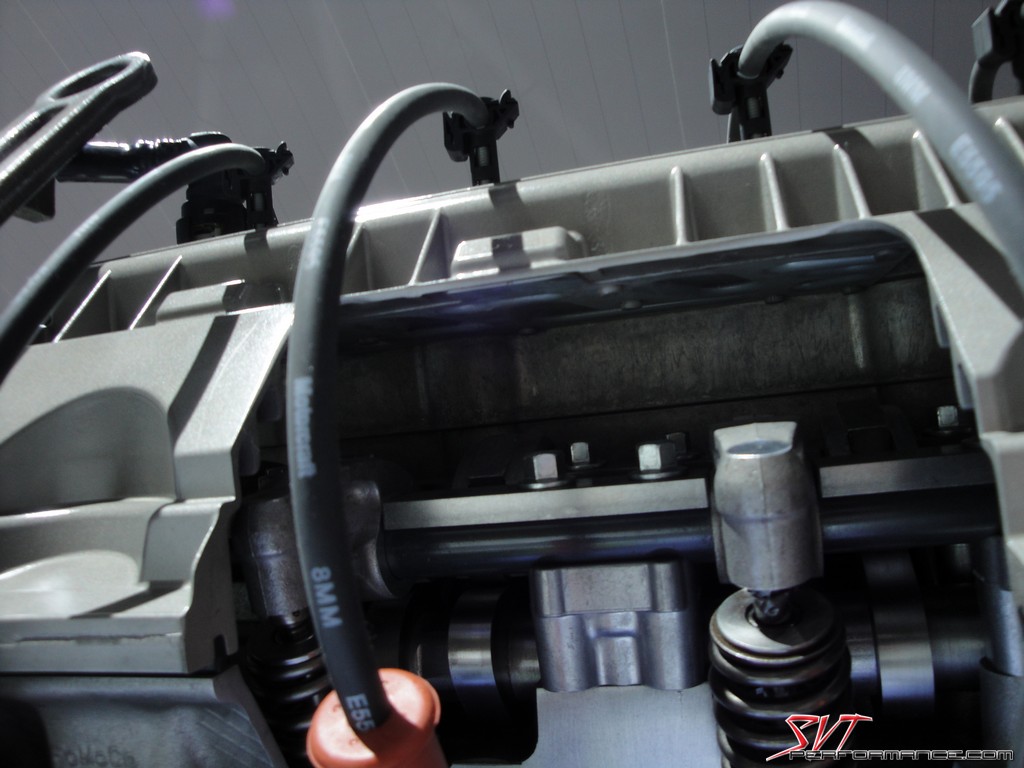
6.2L ignition coils, a part you won't find on a diesel.
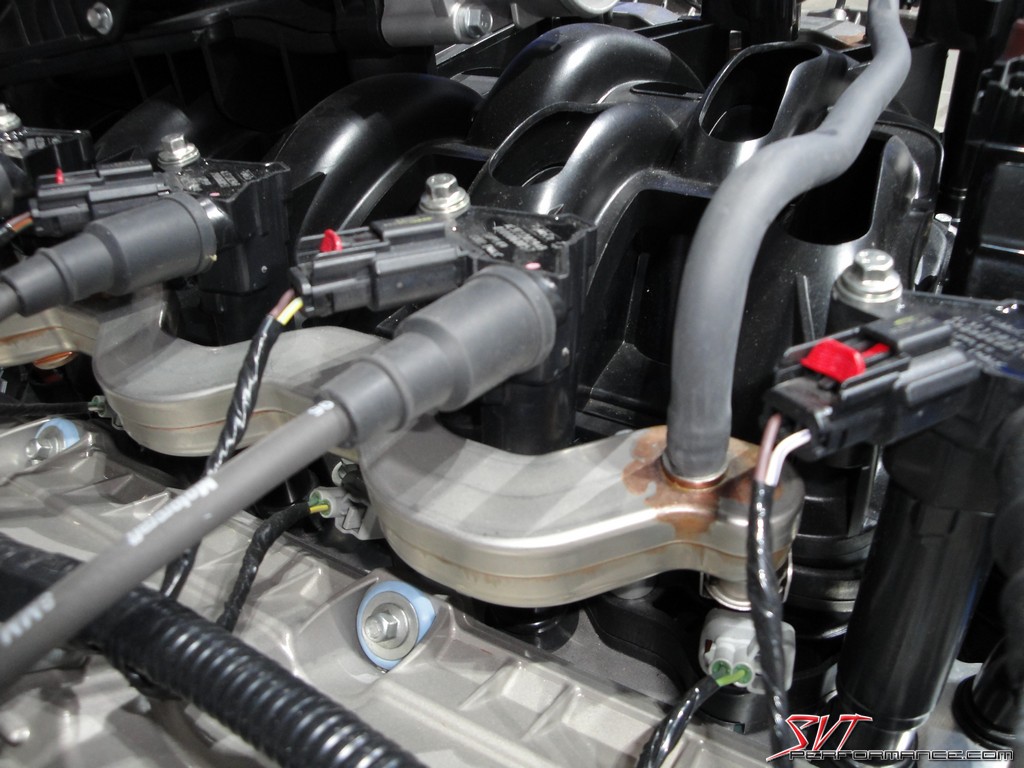
The 6.2L intake manifold features air-control vanes similar to those found in the 5.0L V8 intake.
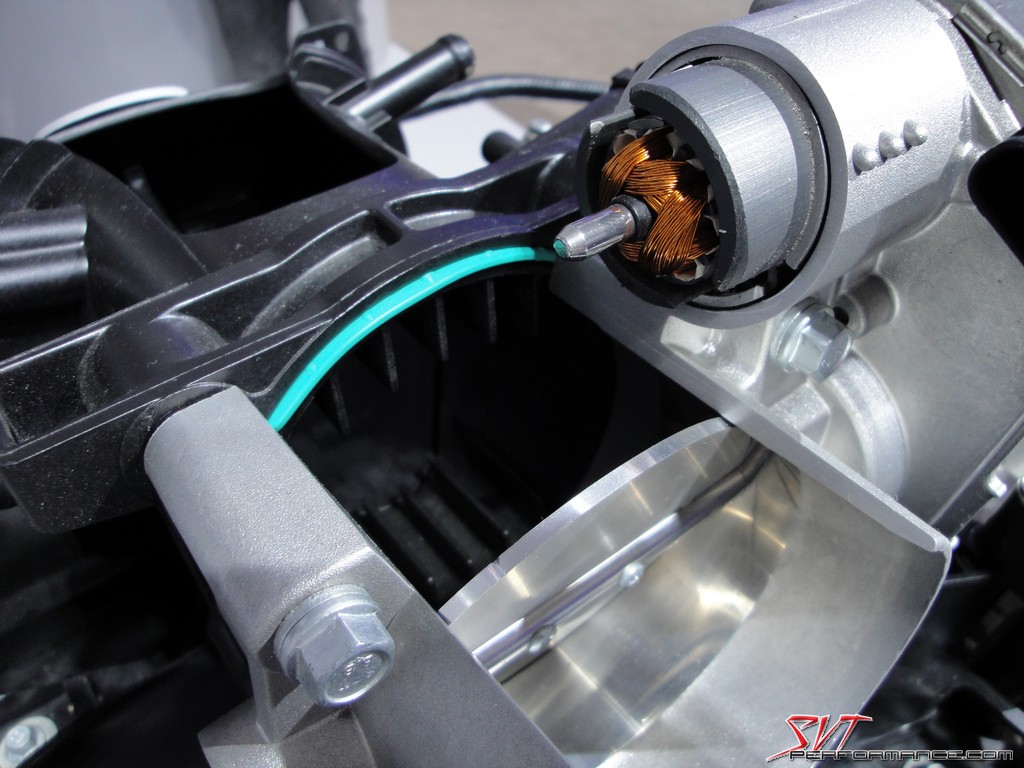
Piston cooling jets were at one time only found in high-performance applications, but are now becoming more commonplace.
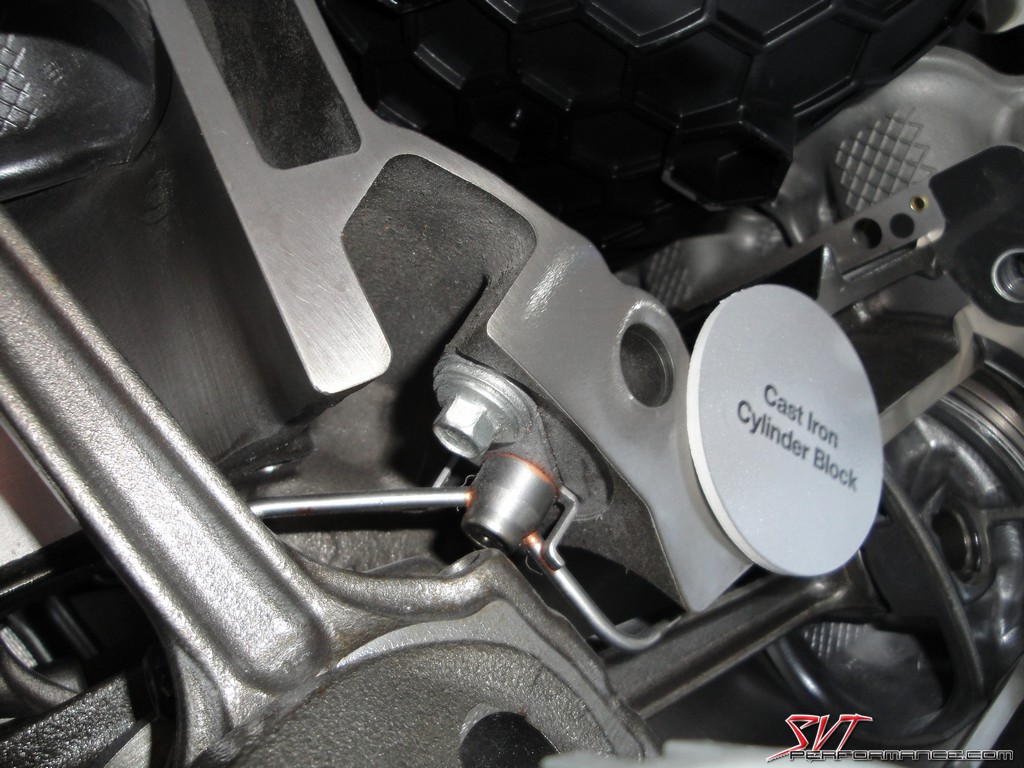
There's a lot of stuff going on under the hood of a 2011 F-150 with a 5.0L V8.
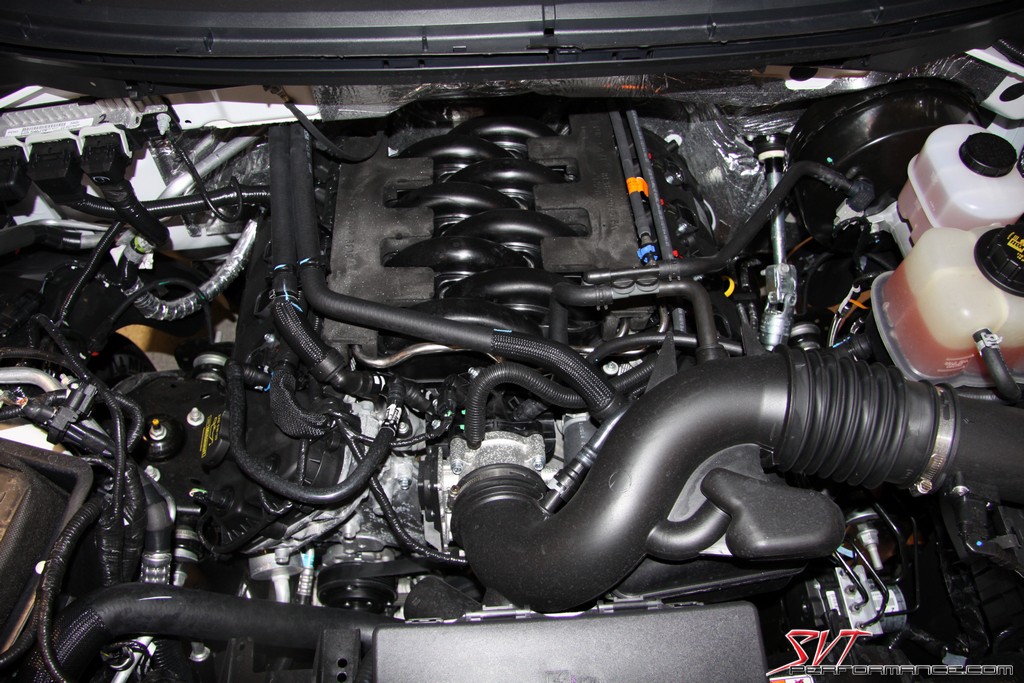
The EcoBoost engines are starting to bridge the gap between gas and diesel engines. They boast many diesel like features, such as turbocharging and direct-injection.

One of the 3.5L EcoBoost's tiny turbos is buried somewhere down there.
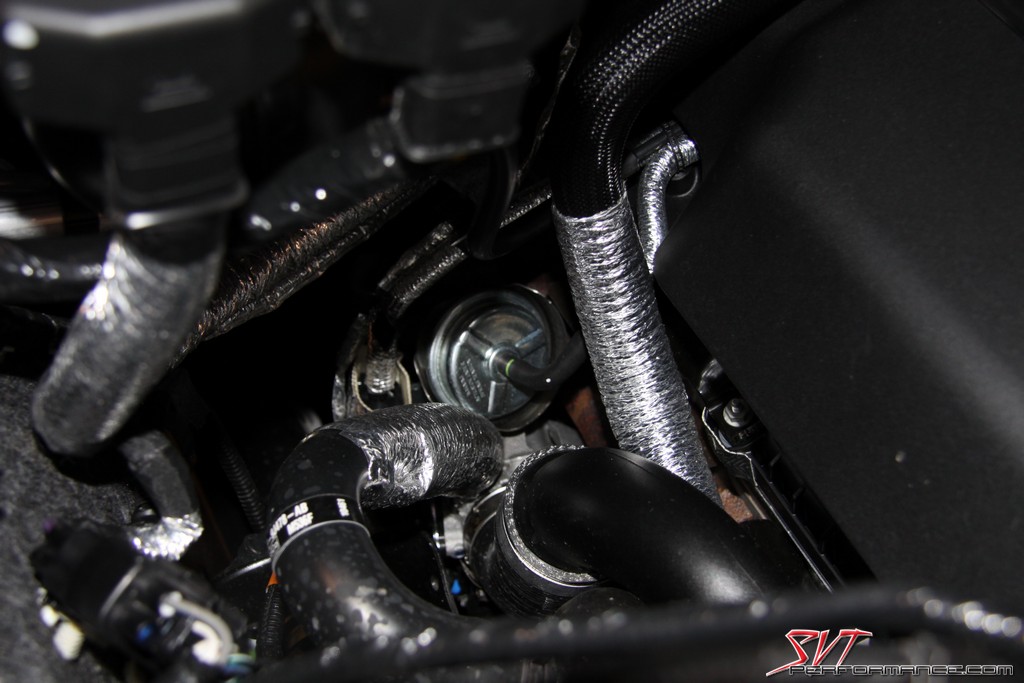
Intercooler pipes and coolant hoses everywhere.
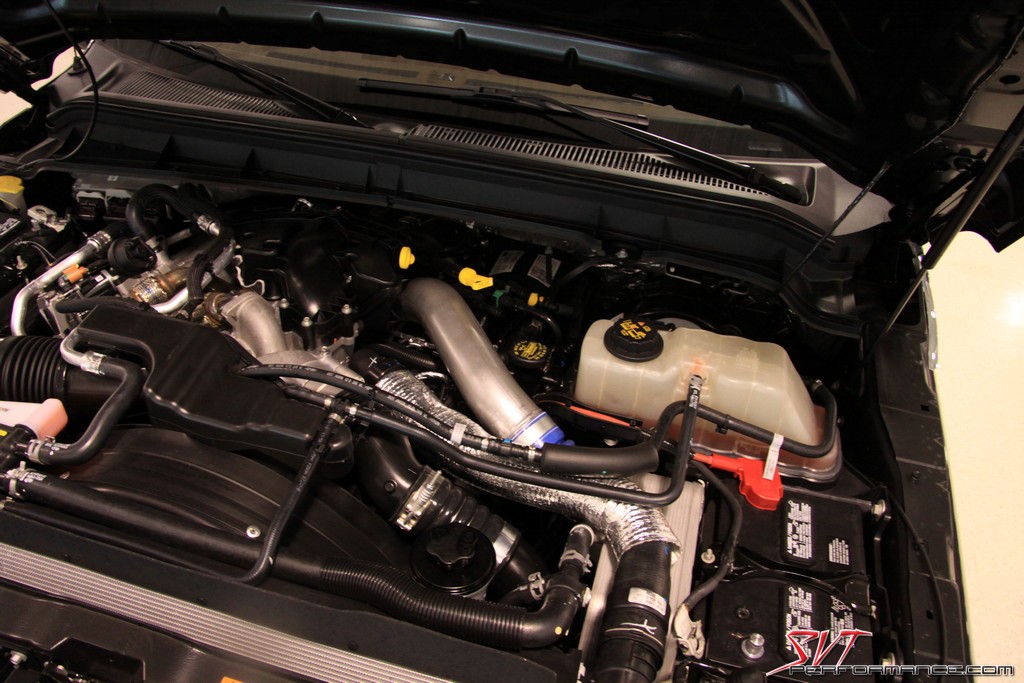
If you're accustomed to working on engines with carburetors and distributors the 6.7L Powerstroke might-as-well be a transwarp drive.
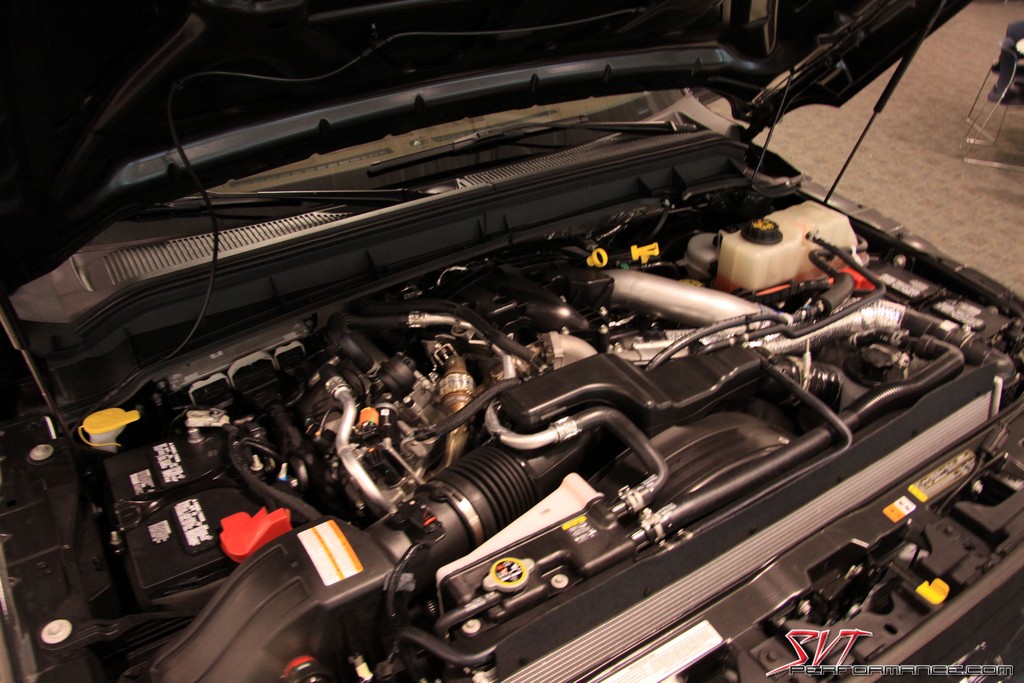
You can't even see a valve cover on this thing.
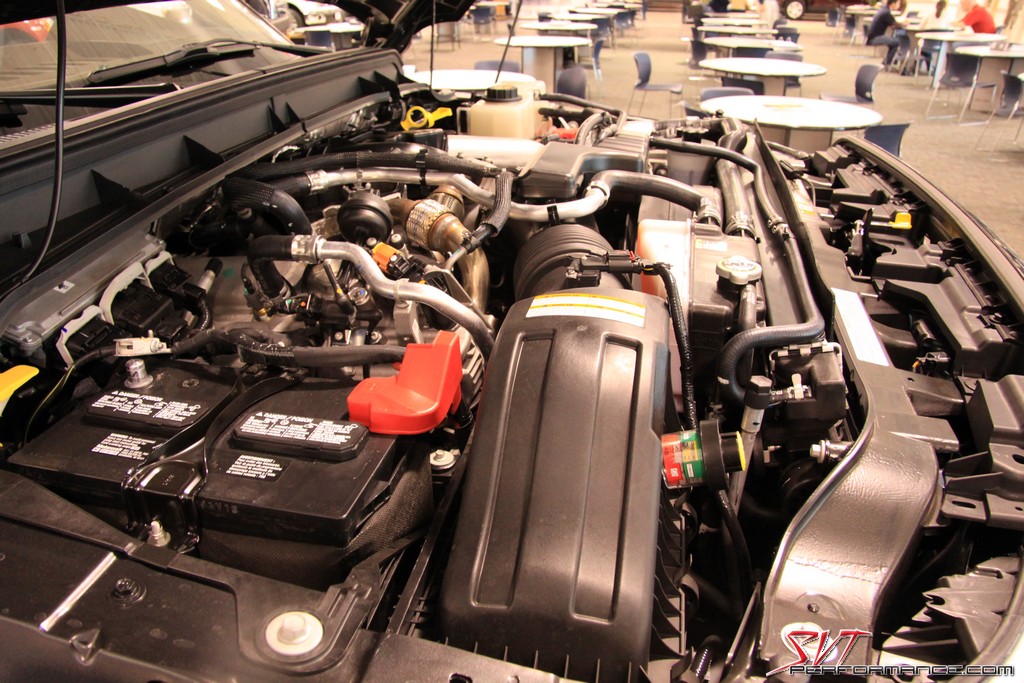
by contrast, the 6.2L is much simpler.
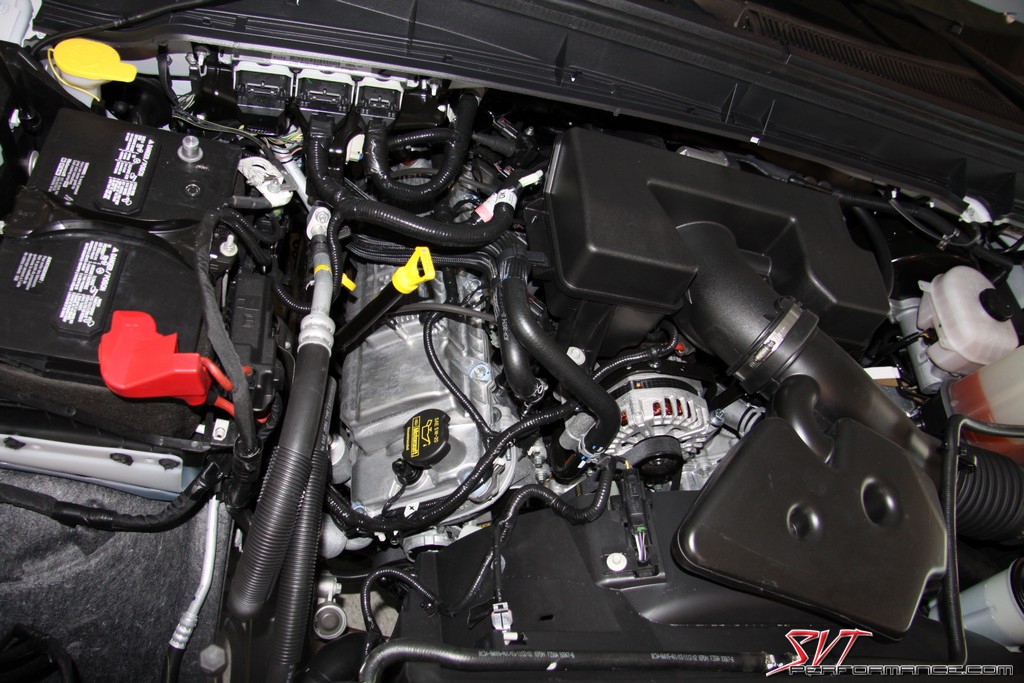
The intake tube has a massive acoustic air-chamber to help silence "unwanted" intake noises.
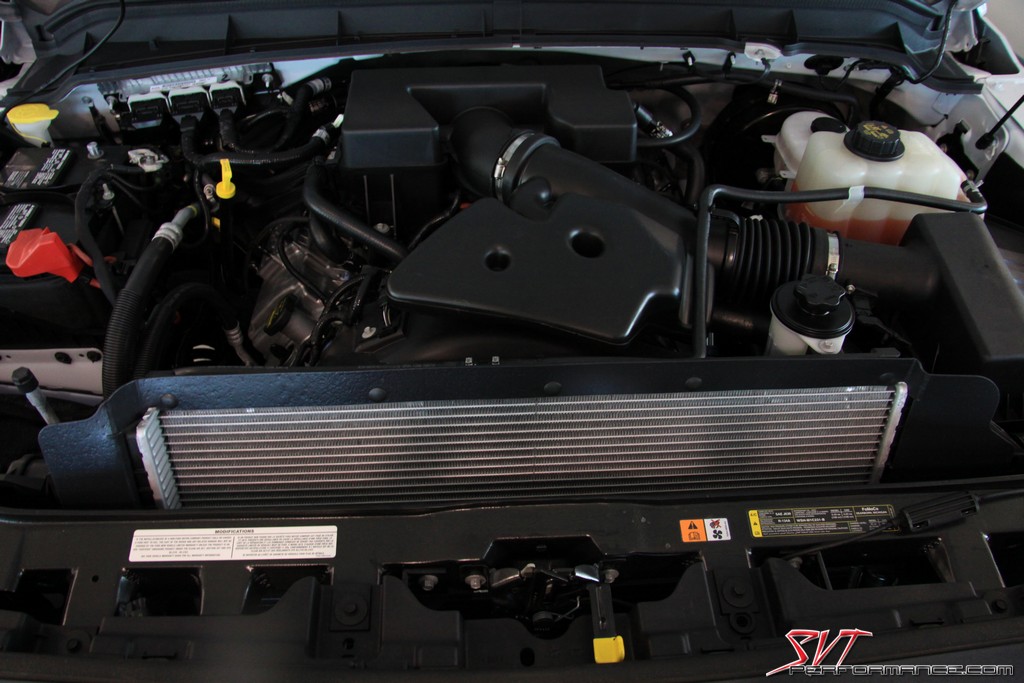
Gotta love those "Powered by Ford" valve covers.
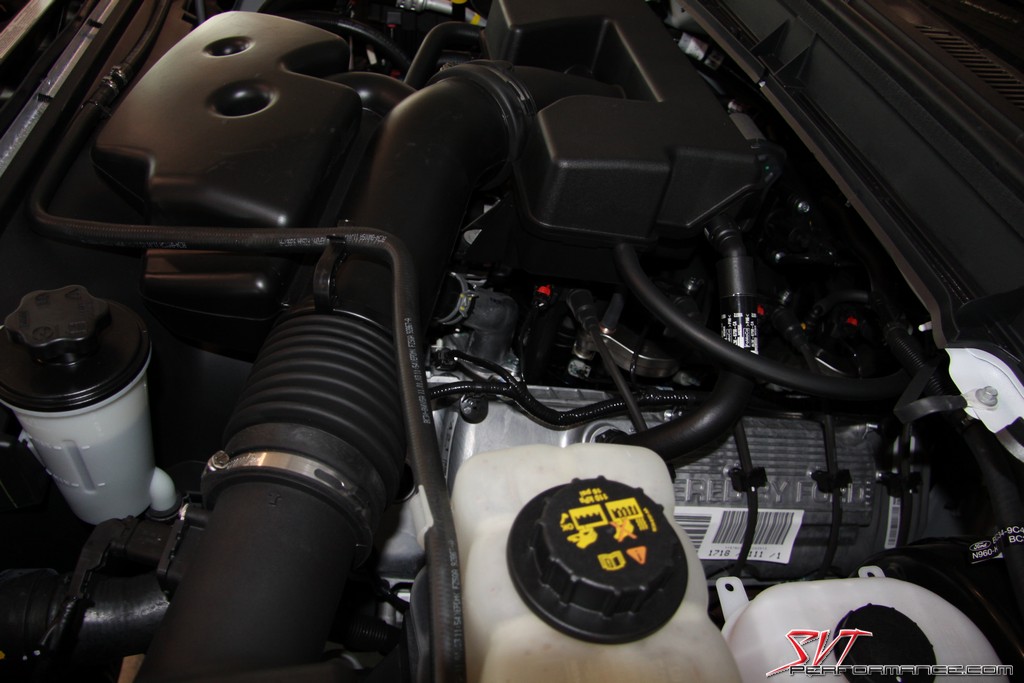

The 6.2L features two spark plugs per cylinder, and a layout that should be familiar to those acquainted with the Modular engine line.

High-Pressure Common-Rail Injection and computer control have revolutionized the world of diesel performance.

Like many modern engines, the 6.7L Powerstroke features a phenolic water pump turbine.

One of the design features found in most diesel engines that leads to their increased durability is a gear driven timing set and high-pressure fuel pump.

With 32 valves, 32 pushrods, and 32 rocker-arms the 6.7L's valve-train is not an uncomplicated affair.

Here you can see the cylinder wall thickness in the Ford 6.2L V8 gas engine. It is cast from typical gray-iron.

By contrast, The 6.7L Powerstroke features much thicker cylinder walls (for durability) and the block is composed of much stronger compacted graphite iron.

The lifters in the 6.7L sizable, to say the least. You can also see a piston cooling oil squirter in this photo.

The turbo is buried under quite a few parts on a 6.7L. Put aside a few hours if you plan on removing it.

The EGR-Cooler is one of the emissions components that has plagued diesel engines for the last few years. The 6.7L seems to have a much better constructed one than the 6.0L and 6.4L Powerstrokes.

Sadly, this massive,power robbing, exhaust system is required in order for the 6.7L Powerstroke to meet the current EPA emission standards.

Variable-geometry turbochargers are basically a diesel industry standard at this point.

This massive torque converter in a 6R140 transmission is found behind the 6.7L Powerstroke. The 6.2L V8 also uses this tranny.

Here you can see beautiful simplicity in the valve-train design of the 6.2L The roller tipped shaft-mounted rocker-arm rides on the centrally mounted camshaft.

A hydraulic lash adjuster is situated on the tip of the valve stem.

6.2L ignition coils, a part you won't find on a diesel.

The 6.2L intake manifold features air-control vanes similar to those found in the 5.0L V8 intake.

Piston cooling jets were at one time only found in high-performance applications, but are now becoming more commonplace.

There's a lot of stuff going on under the hood of a 2011 F-150 with a 5.0L V8.

The EcoBoost engines are starting to bridge the gap between gas and diesel engines. They boast many diesel like features, such as turbocharging and direct-injection.

One of the 3.5L EcoBoost's tiny turbos is buried somewhere down there.

Intercooler pipes and coolant hoses everywhere.

If you're accustomed to working on engines with carburetors and distributors the 6.7L Powerstroke might-as-well be a transwarp drive.

You can't even see a valve cover on this thing.

by contrast, the 6.2L is much simpler.

The intake tube has a massive acoustic air-chamber to help silence "unwanted" intake noises.

Gotta love those "Powered by Ford" valve covers.

Cheers:beer:
-SID297


